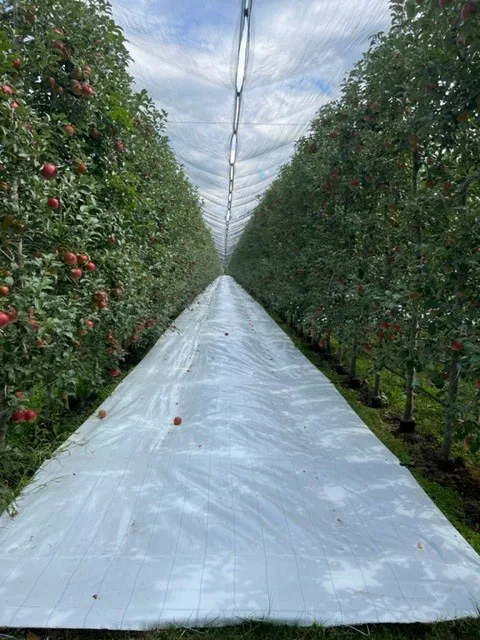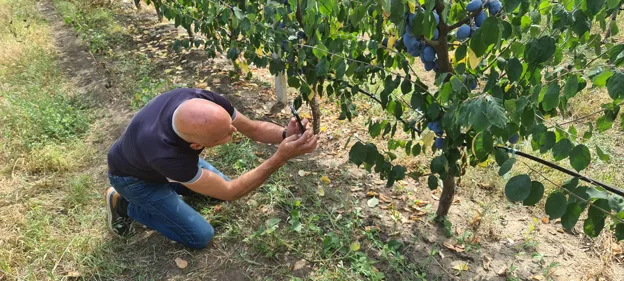Despite their good quality, few supermarkets in the Netherlands offer Moldovan fruit and vegetables. Yet, Dutch fruit and vegetable businesses recognize how motivated, hard-working, and good migrant workers from that Southeastern European country are.
Every year, Cees van Doorn, founder of the VDU Uitzendbureau arranges jobs in Dutch cultivation companies and packaging facilities for more than 1,200 (including some 400 Moldovan) people. He accompanied Pieter Boekhout and CBI representative Piet Schotel on their tour of Moldovan fruit companies in early September.
In this article, Cees shares his view of that country's fruit sector's strengths, weaknesses, opportunities, and challenges. He looks not only through the glasses of a staffing agency manager but also as a former fruit grower. A dual expert, then. But before Cees' impressions of the trip, first, some information about his company and migrant workers in the Dutch fruit and vegetable sector.
First Poles, now Moldovans
"We have roots in the fruit sector, and from there, in 2000, we began a job agency that specializes in the fruit and vegetable chain," begins Cees. "Our hundreds of casual workers, and we know the sector like no other. We started with Polish workers from Silesia. They were eligible for German passports from the 1990s."
"That region had previously been German territory. Passports are expensive, and you must often wait six months for them. That was a clear sign that those Poles who came to Western Europe were motivated and single-minded: they wanted to work to send money home. So migrant workers are generally highly valued fruit and vegetable company employees."
Five years ago, Van Doorn visited Moldova for the first time to see what he could offer that poor European country's people regarding jobs in the Netherlands. As with Poles some 25 years ago, Moldovans can apply for an EU passport via its big neighbor Romania. That opens EU work contract doors for them.
"There's little difference between the Moldovans coming to work in the Netherlands now and the Poles back then. They're highly motivated and westernize quickly. What's striking is that Moldovans have a lot of affinity with the agricultural sector. That's not unusual once you discover that a quarter of that country's GDP is generated in the primary sector, and almost every Moldovan has a vegetable patch. People there still grow much of their own food. That ingrained know-how is greatly beneficial for Dutch fruit and vegetable companies. Not only are the Moldovans motivated; they have specific knowledge too," says Cees.
Pleasant surprise
Since then, he has been to Moldova - the sixth-biggest agricultural region of the erstwhile USSR - multiple times. But this trip with Pieter and Piet impressed him, Cees says. "It's amazing how the Moldovan fruit sector has managed to change from a production model with old varieties and traditional growing methods to a modern industry with advanced companies. Those are run by driven managers who also have a great deal of expertise. And all that, in barely 15 years. They have large canopied orchards with trees in rows, sometimes more than a kilometer long."
"It then becomes evident that Moldova could become a major exporter. What's remarkable is that the country's cultivation/pruning method (long slender trees, sometimes up to three meters high) is extremely suitable for picking robots. Their orchards are literally walls of fruit. Its high-quality, uniform harvest already puts this country squarely among the top European fruit growers. They have things very well under control but lack commercial spirit. Although that's often typical among growers, including those in the Netherlands," Cees continues.
Cees inspects Moldovan plums
He says Moldova's soil and climate are excellent for apple, grape, and stone fruit cultivation. "They grow hardly any pears; the Dutch climate is better for that. I suspect the temperate continental climate also makes things like crop protection much easier there than in northwestern Europe. I've not, for instance, seen much fruit tree canker at all."
The trump card: flavor
"And then there is the products' flavor. Moldovan fruit and wine - let's not forget that - is delicious. The growers are convinced they grow the most flavorful fruit in Europe. And they may well be right. They can compete at the highest level with other countries, no doubt about that. That's why it's so unfortunate that Moldova has such a negative image. Many of us imagine a bleak, poor, colorless former Soviet state where time has stood still. And so, in our minds, the products they market are tasteless and colorless too. Nothing could be further from the truth. Moldova will, however, have to make an effort to shake off that image. I don't think they quite understand that yet," explains Cees.
Efficiency, infrastructure, and renewed varieties urgently needed
Variety renewal is something some companies still have to work on too. "Because, flavor alone won't get you there. You also need varieties that meet different market demands. Most growers are well aware of this and are already putting great effort into variety renewal. Western European consumers aren't keen on the fruit that was well-received in Russia. In that sense, flavor is not the sole determining factor, so is color, especially with apples."
However, a major obstacle to doing business successfully in Moldova is the lack of infrastructure. Some packing facilities and cold stores are located far away from orchards, so good road infrastructure is a must. "That's Moldova's huge issue - they don't have a very extensive road network, most of which is in questionable condition. It sometimes takes an hour too long to travel 10km, as the crow flies," says Cees.
Cultivation and packaging efficiency are other things that still have a long way to go, he adds. "The work pace is much slower than in the Netherlands, and I think staff management could be better. Sometimes it seems managers are afraid to address their personnel for fear of losing them. As wages rise, working more efficiently will certainly become a priority."

White plastic provides more reflection in the orchard and better coloration of the fruit
Rising wages
And Cees is sure wages will rise sharply. He has noticed a rapidly increasing labor shortage in Moldova over the past five years, particularly in agriculture and horticulture. "There, unemployment has virtually disappeared in a few years. Currently, good tractor drivers can already earn around €1,000. With the rising demand for domestic workers, those wages, too, will climb. In Poland, that wage equalization to Western European standards process took 20 years; in Moldova, I see that happening within a few years," he admits.
And then, since they have no added travel or accommodation costs in their own country, Moldovans will, naturally, become increasingly less inclined to go and work in Western Europe. "I, thus, suspect Western Europe will only be able to count on Moldovan workers for a short time, while it could make grateful use of Polish workers for several decades."
"Anyone who thinks they can rely on workers from other Eastern European countries for another few decades will be disappointed, too, I fear. Robotization will, therefore, soon no longer be a luxury but a dire necessity throughout Europe. As a staffing agency, we, too, will have to adjust our strategy. Even Moldovan cultivation companies and packing facilities are already cautiously considering migrant workers from, say, Kazakhstan, Azerbaijan, or Albania," Cees concludes.

Cees is impressed by the quality and taste of Moldovan fruit
For more information:
C.J. (Cees) van Doorn
VDU Uitzendbureau
Achterweg 38
4181AE Waardenburg
Tel: +31 6 53 38 35 21
vandoorn@ceesvandoorn.nl
www.vdu.nl
